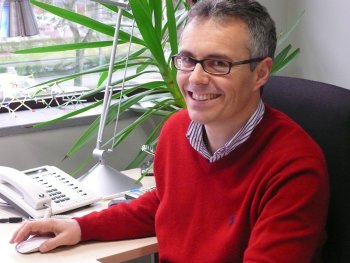Dec 19 2011
Ángel Rubio, professor of Material Physics, and director of the University of the Basque Country (UPV/EHU)'s NanoBio Spectroscopy Group, was recently appointed external scientific director of the Physics, Chemistry and Technology section of the Fritz Haber Institute in Berlin run by the prestigious Max Planck Society.
An official ceremony in Germany will soon take place, in which he will take up this post held for life. Ángel Rubio will combine his work as a researcher in the UPV/EHU with his new position as external director of the group in the Max Planck Institute in Berlin.
 UPV/EHU professor Ángel Rubio appointed external director of Max Planck Society's Fritz Haber Institute.
UPV/EHU professor Ángel Rubio appointed external director of Max Planck Society's Fritz Haber Institute.
When choosing new external scientific directors, Max Planck Society values not only candidates' contributions to the advancement of science, but the possibility of achieving future social or scientifically recognised applications. Ángel Rubio was selected because of "his pioneering contribution to the fields of new materials, nanoscience and biophysics, as well as the development and implementation of new techniques and theories applied to the modelling of theoretical spectroscopy".
"It is very rewarding that your work is internationally recognised. This new position, as well as personal prestige, consolidates the research group I lead in the Max Planck Society in Berlin, and gives it the chance to grow, become established and continue, together with the NanoBio Spectroscopy Group I direct in the UPV/EHU, as one of the reference groups worldwide in the fields of modelling of materials and nanoscience," explains Ángel Rubio.
The Basque group, with headquarters in the Joxe Mari Korta Centre in the Gipuzkoa Campus, is currently made up of 25 researchers, as well as another five who belong to the group in Max Planck in Berlin. Thanks to the studies conducted by Professor Rubio and his theoretical group, they have become a worldwide reference in the field of modelling of nanometric materials with the aim of understanding or predicting the behaviour of materials with certain stimuli such as light. New simulation techniques have also been designed to find out how nanostructures and biomolecules act. The result of his work is oriented towards specific applications such as light emission devices, new photovoltaic materials, chemical and biological sensors, the search for more efficient materials to receive and transmit energy, or artificial photosynthesis.
This year, Ángel Rubio was named "fellow" of the American Association for the Advancement of Science (AAAS), the main scientific society in the world, and he was recently awarded one of the prestigious ERC Advanced grants for senior researchers by the European Research Council.